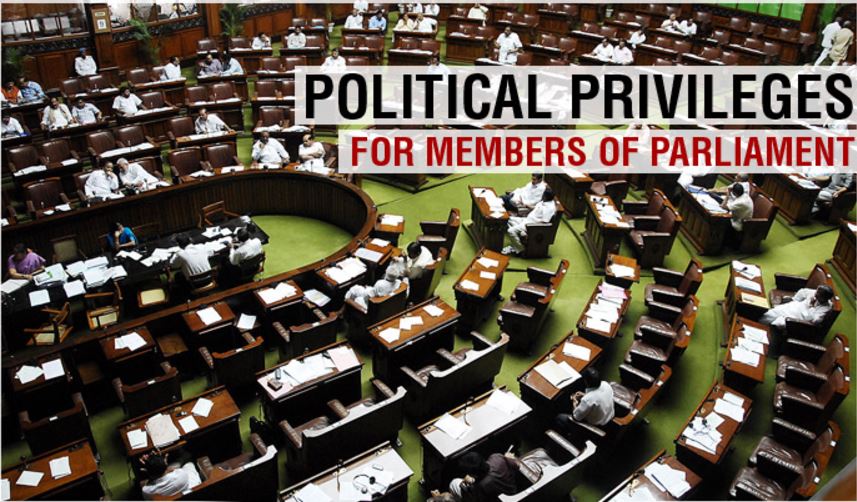Codification of Parliamentary Privileges had come into the limelight once again by the recent case of the Karnataka assembly Speaker ordered the imprisonment of two journalists viz. Ravi Belagere of the tabloid Hi Bangalore and Anil Raj of Yelahanka Voice, for a year based on recommendations of its privilege committees. Earlier in 2003, the Tamil Nadu assembly speaker directed the arrest of five journalists for publishing articles that were critical of the AIADMK government.This had led to a widespread criticism as an effort to throttle the media.
Similar kind of punishment for breach of privilege has been a regular affair in India which had drawn the matter to the forefront whether the codification of parliamentary privilege is required or not.
What constitutes Parliamentary privileges
Parliamentary privileges are special rights, immunities etc enjoyed by the member of Parliament and the state legislature, their committees and their individual member.
They are of two kinds viz Collective Privilege enjoyed by house and committee as a whole and Individual Privilege enjoyed by an individual member of parliament and the state legislature.
Source of Privileges
The Constitution recognises the privileges of Parliament and state legislatures under Articles 105(dealing with privileges of parliament) and 194(dealing with privileges of the state legislature), respectively. These sections protect the freedom of speech of parliamentarians and legislators, insulate them against litigation over matters that occur in these houses, and give powers to define the powers, privileges and immunities of a house, its members and committees Certain privileges, like the freedom of speech within the legislature, are codified under these provisions. On the others, the Constitution says that legislatures enjoy the same privileges as those of the House of Commons until the privileges are “so defined” by the legislatures.
Breach Of Privileges
There is no clearly laid out rules about what constitutes a breach of privileges and what is the corpus of punishment for that.In other words, parliamentary privileges are not codified. In Karnataka, privileges panels often refer to ‘Practice and Procedure of Parliament’ by M N Kaul to define breach of privilege.It means that parliamentarians are the judges in their own cause where chances of the conflict of interest and violation of a fair trial are clearly sighted.
Judicial Interpretation of Parliamentray Privileges
In ‘Searchlight’ case (I) (M.S.M. Sharma vs. S.K. Sinha, AIR 1959 S.C. 395), Supreme Court held that the power of judicial review, applicable to ordinary law, could not be invoked to challenge an order made under Article 194, a Constitutional provision.
In Keshav Singh’s case, the Supreme Court clarified that Article 21 (Right to Life and Personal Liberty) would be applicable even when Legislatures exercised their powers in respect of their privilege. However, the position regarding Freedom of Speech being subservient to legislative privilege was confirmed.
In Raja Ram Pal v Hon’ble Speaker, Lok Sabha and Ors., (2007) 3 SCC 184, The Supreme Court held that Fundamental Rights under Articles 20 and 21 could prevail over privileges under Articles 105 and 194. However, no mention was made of rights under Article 19 (1) (a) relating to Freedom of Speech.
In Algaapuram R Mohanraj v Tamil Nadu Legislative Assembly, WP (C) 455 of 2015 examined the issue The Supreme Court rejected the violations of the Right to Speech, Right to Expression, Right to Life in the case of breach of privileges, it upheld contention regarding violation of the Right to Equality was upheld.
Thus the judiciary had been frequently sucked in the case of parliament’s unbridled power in case of breach of privileges when it comes in conflict with Fundamental Rights.However, without codification, Searchlight Judgement is still applicable which tilts it in favour of Parliament.
Arguments against Codification of Parliamentary Privileges
1.It would challenge the Sovereignty of Indian Parliament.
2.It would lead to judicial scrutiny of privileges especially when it comes in conflict with fundamental rights.
3.It would make the evolution of new privileges very difficult.
- The members should have the freedom to discharge their functions, including the right to speak and vote within Parliament, without the fear and favour which requires these parliamentary privileges.
Argument in favour of Codification of Parliamentary Privileges
- The Constitution implicitly provided for a law to codify privileges and adopted the practice in the House of Commons as a temporary measure. The Constitution says that “In the absence of any law, such privileges would be the same as those enjoyed by the House of Commons at the commencement of the Constitution”.However, this provision was amended in 1978 to state that the privileges would be the same as enjoyed by the Houses of Indian Parliament as on the date of effect of that amendment.
2.Codification would fix the exact limit of the breach of privileges after which no punishment can be inflicted.
3.It would define precisely what constitutes and amounts to a breach of privileges.
4.Relief from the court can be easily available if privileges are codified.
Analysis
In a vibrant democracy Like India where the constitution and not Parliament is sovereign, its high time that parliamentary privileges should be codified for its clear interpretation.In fact, many countries have codified it like Australia.However seeing its misuse in few cases and its clash with fundamental rights especially right to free speech and right to life. There is a need for a law codifying the legislative privileges, define the limits of penal action for breach of privilege and procedures to be followed. The Legislature must use the power to punish for contempt or breach of privilege sparingly, invoking it mainly to protect the independence of the House and not to take away the liberty of critics.
You may also like to Read-The Parliament : Lok Sabha and Rajya Sabha



